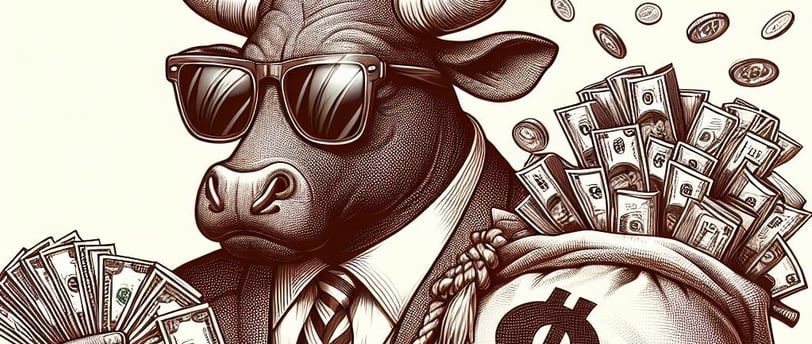Global Wealth Disparity: Exploring the Total Amount of Money in Existence
Explore the staggering global wealth disparities and their impact on poverty in our latest article. Understand the concentration of wealth, the role of government policies, philanthropy, and innovative economic models like universal basic income in addressing wealth inequality. Join the discussion on ethical implications and the global fight against poverty to create a more equitable world.


When we think about the total amount of money in existence globally, it's easy to get lost in the staggering figures and mind-boggling statistics. From physical currency to digital assets, the sum of wealth in the world is both awe-inspiring and concerning. In this article, we delve into this topic, examining the stark disparities in wealth distribution and the impact it has on global poverty.
The Concentration of Wealth
It is a well-known fact that a small fraction of the global population controls a vast majority of the world's resources. This concentration of wealth has far-reaching implications, perpetuating a cycle of poverty that affects billions of people worldwide. The rich get richer, while the poor struggle to escape the clutches of destitution.
According to a report by Oxfam, the top 1% of the world's population owns more than twice the wealth of the bottom 90%. This startling statistic highlights the extreme inequality that exists in our world today. The rich accumulate wealth at an unprecedented rate, while the majority of the population struggles to make ends meet.
The Role of Government Policies
Government policies play a crucial role in addressing wealth disparities and alleviating poverty. By implementing progressive taxation systems, governments can redistribute wealth from the rich to the poor. This ensures that those who have the means contribute their fair share to society, enabling the government to invest in social welfare programs and infrastructure development.
Additionally, governments can implement regulations to prevent tax evasion and the hoarding of wealth in offshore accounts. By closing these loopholes, governments can ensure that wealth is distributed more equitably and that everyone pays their fair share of taxes.
The Power of Philanthropy
Philanthropy also has the potential to make a significant impact in the fight against poverty. Wealthy individuals and corporations have the resources to make substantial donations to charitable causes. By directing their wealth towards initiatives that address poverty and inequality, philanthropists can help bridge the gap between the rich and the poor.
However, it is important to note that philanthropy should not be seen as a substitute for government action. While charitable donations can provide immediate relief, they do not address the systemic issues that perpetuate poverty. Philanthropy should work in tandem with government policies to create lasting change and ensure a more equitable distribution of wealth.
Innovative Economic Models
As we grapple with the complex issue of wealth disparity, innovative economic models like universal basic income (UBI) have gained traction. UBI is a system in which every citizen receives a regular, unconditional sum of money from the government, regardless of their employment status.
Proponents of UBI argue that it can provide a safety net for those living in poverty, ensuring that everyone has access to basic necessities. By guaranteeing a minimum income, UBI has the potential to alleviate poverty and reduce inequality. However, critics argue that UBI may disincentivize work and lead to a reliance on government support.
While the debate around UBI continues, it highlights the need for innovative economic models that address wealth disparity and ensure a more equitable distribution of resources.
The Ethical Implications
Addressing wealth disparity and fighting global poverty is not just an economic issue; it is an ethical imperative. The concentration of wealth in the hands of a few goes against the principles of fairness and justice. It perpetuates a system where opportunities are limited, and social mobility is hindered.
We must strive for a society where everyone has equal access to opportunities and resources. This requires a collective effort from governments, philanthropists, and individuals to challenge the status quo and work towards a more equitable world.
The Global Fight Against Poverty
The fight against poverty is a global endeavor that requires collaboration and cooperation. Governments, international organizations, and individuals must come together to address the root causes of poverty and implement sustainable solutions.
Investing in education, healthcare, and infrastructure development are key components of poverty alleviation. By providing access to quality education and healthcare, we empower individuals to break free from the cycle of poverty. Additionally, infrastructure development creates job opportunities and stimulates economic growth, benefiting the entire community.
Furthermore, addressing wealth disparity requires a shift in societal attitudes and values. We must challenge the notion that extreme wealth is a measure of success and instead focus on creating a society where everyone has the opportunity to thrive.
Conclusion
The total amount of money in existence globally is a staggering figure, but what truly matters is how that wealth is distributed. The concentration of wealth in the hands of a few perpetuates poverty and inequality on a global scale. Government policies, philanthropy, and innovative economic models all have a role to play in addressing these disparities and creating a more equitable world.
By implementing progressive taxation systems, closing loopholes, and investing in social welfare programs, governments can redistribute wealth and alleviate poverty. Philanthropy can make a significant impact by directing resources towards initiatives that address poverty and inequality. Innovative economic models like universal basic income offer potential solutions, but they must be carefully evaluated and implemented.
Ultimately, addressing wealth disparity and fighting global poverty is not just an economic imperative; it is an ethical obligation. We must work together to challenge the status quo and create a world where everyone has equal access to opportunities and resources.
